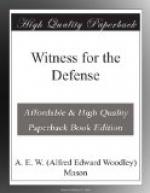“Do they know you have it?” Thresk asked.
“Of course they do. You had proof that they knew five minutes ago when that brown arm wriggled in under the tent-wall.”
Ballantyne’s fear returned upon him as he spoke. He sat shivering; his eyes wandered furtively from corner to corner of the great tent and came always back as though drawn by a serpent to the floor by the wall of the tent. Thresk shrugged his shoulders. To dispute with Ballantyne once more upon his delusion would be the merest waste of time. He took up the photograph again.
“How do you come to possess it?” he asked. If he was to serve his host in the way he suspected he would be asked to, he must know its history.
“I was agent in a state not far from Poona before I came here.”
Thresk agreed.
“I know. Bakuta.”
“Oh?” said Ballantyne with a sharp look. “How did you know that?”
He was always in alarm lest somewhere in the world gossip was whispering his secret.
“A Mrs. Carruthers at Bombay.”
“Did she tell you anything else?”
“Yes. She told me that you were a great man.”
Ballantyne grinned suddenly.
“Isn’t she a fool?” Then the grin left his face. “But how did you come to discuss me with her at all?”
That was a question which Thresk had not the slightest intention to answer. He evaded it altogether.
“Wasn’t it natural since I was going to Chitipur?” he asked, and Ballantyne was appeased.
“Well, the Rajah of Bakutu had that photograph and he gave it to me when I left the State. He came down to the station to see me off. He was too near Poona to be comfortable with that in his pocket. He gave it to me on the platform in full view, the damned coward. He wanted to show that he had given it to me. He said that I should be safe with it in Chitipur.”
“Chitipur’s a long way from Poona,” Thresk agreed.
“But don’t you see, this trial that’s coming along in Calcutta makes all the difference. It’s known I have got it. It’s not safe here now and no more am I so long as I’ve got it.”
One question had been puzzling Thresk ever since he had seen the look of terror reappear in Ballantyne’s face. It was clear that he lived in a very real fear. He believed that he was watched, and he believed that he was in danger; and very probably he actually was. There had, to be sure, been no attempt that night to rob him of it as he imagined. But none the less Salak and his friends could not like the prospect of the production of that photograph in Calcutta, and would hardly be scrupulous what means they took to prevent it. Then why had not Ballantyne destroyed it? Thresk asked the question and was fairly startled by the answer. For it presented to him in the most unexpected manner another and a new side of the strange and complex character of Stephen Ballantyne.




